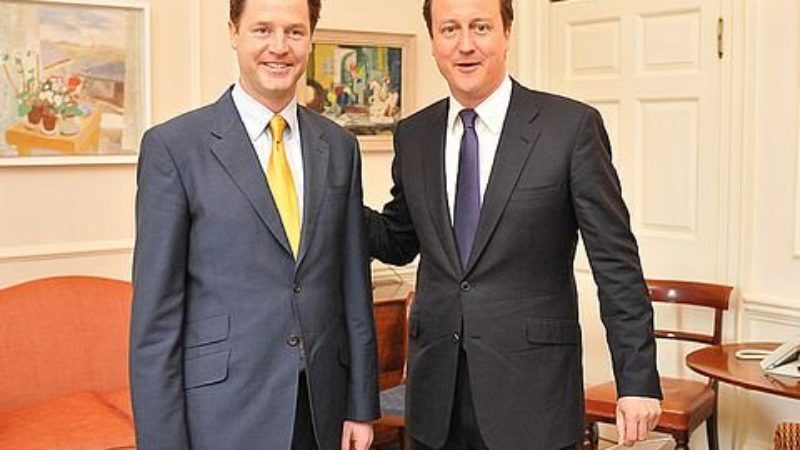
It is late 2014 and less than a year to go before the forthcoming 2015 general election.
The UK economy is improving, but not substantially. Labour is not trusted on the economy and the Conservatives are not trusted on the NHS. The Liberal Democrats are facing annihilation at the polls. Everything points to another hung parliament with Labour marginally ahead. So how does this play out?
The Liberal Democrats formed a coalition with the Conservatives in 2010 to eradicate the deficit. In July 2011 it became clear in HM Treasury’s Green Book that the Coalition’s deficit reduction plans will continue into the first two years of the next parliament.
This means it would be extremely difficult for a coalition between the Liberal Democrats and Labour to be formed.
The Liberal Democrats’ only chance of fending off electoral annihilation will be to stand as a coalition with the Conservatives. This will mean the parties divvying up seats between them.
This will be the only way the Conservatives can guarantee stopping a minority Labour administration winning power whilst ensuring their right wing is neutered.
Both the Liberal Democrats and Conservatives will argue to their supporters that their reason for coming together is that the job of deficit reduction is not yet complete and there is too much at stake to turn back now. To keep the Conservative right wing on board, there may be a coalition promise to enact the conveniently forgotten 2009 Liberal Democrat policy of a referendum on Europe should the coalition be returned to power.
I recently stated this view of the coalition parties standing together at the next general election to both Alistair Campbell and Gyles Brandreth with a mixed response. However history sets the context for such a deal.
The 1918 general election was referred to as the ‘coupon election’. A coalition letter was sent to all Conservative and Liberal candidates fighting on a platform to continue the coalition. The letters were all dated 20 November 1918 and were signed by Prime Minister, David Lloyd George for the Coalition Liberals and Andrew Bonar Law, the leader of the Conservative Party. Asquithian Independent Liberals were devastated in the election.
Many also forget of the National Liberal Party that operated from 1931 to 1968 until its merger with the Conservatives. These Liberals were opposed to maintaining the National Labour Government in office. Michael Heseltine stood as a National Liberal in Gower in 1959 before being more successful standing as a Conservative in more winnable seats.
National Liberals remained in close collaboration with Conservatives until their merger in 1968. As late as 1962 the National Liberals still had cabinet ministers such as John Scott Maclay, the Secretary of State for Scotland. He was sacked in the night of the long knives by Harold Macmillan in 1962.
On Sunday 25th March 2012 The Independent published some quotes from Liberal Democrat Chief Secretary to the Treasury, Danny Alexander. He said:
“The Liberal Democrats are an independent party… But what we are committed to doing as a government… is to maintain our fiscal consolidation until it’s completed. That will involve making some choices about the first two years of the next Parliament. That doesn’t preclude the Liberal Democrats from offering a different direction of public spending once that process is completed.”
He added: “I’m absolutely certain the Coalition will not just stay together until 2015 but continue to make big choices for this country.”
If the economy does not turn a corner by late 2014 or Labour does not regain public trust on the economy, we will see coalition 2.0 in 2015.




More from LabourList
‘Labour won’t stop the far right by changing leaders — only by proving what the left can deliver’
‘Cutting Welsh university funding would be economic vandalism, not reform’
Sadiq Khan signals he will stand for a fourth term as London Mayor